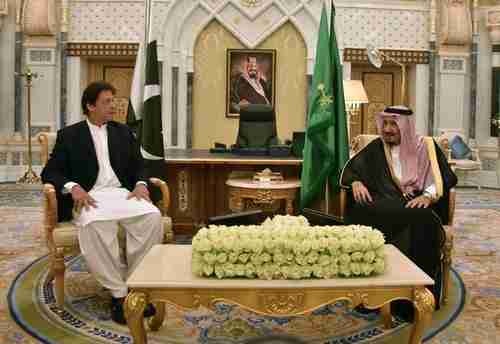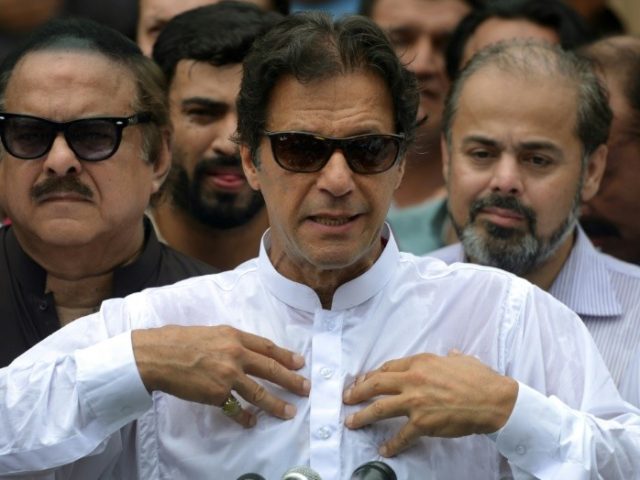This morning’s key headlines from GenerationalDynamics.com
- Pakistan’s ‘desperate’ Imran Khan attends Saudi investment summit amid Khashoggi crisis
- Imran Khan considers the options in asking the IMF for a loan
Pakistan’s ‘desperate’ Imran Khan attends Saudi investment summit amid Khashoggi crisis

Pakistan prime minister Imran Khan meets Saudi King Salman (MBS’s father) on Tuesday in Riyadh (AFP)
The bizarre story of the gruesome death of Saudi-born Washington Post journalist Jamal Khashoggi in the Saudi Arabian embassy in Istanbul, Turkey, seems to be settling down in the last couple of days, largely because Turkey’s president Recep Tayyip Erdogan has so far refused to accuse Saudi’s crown prince Mohammed bin Salman (MBS) of being personally involved. Now, MBS is saying that it was “a heinous crime that cannot be justified” and that “those behind this crime will be held accountable … in the end, justice will prevail.” It may be that Erdogan is holding back some evidence for use as leverage against MBS at some future time.
MBS has been holding a three-day conference called the Future Investment Initiative, whose purpose is to invite investments from countries around the world. Thanks to the Khashoggi scandal, many world leaders are boycotting the conference, although many of those have sent high-level representatives in their place. Reports are that the conference is going well for MBS despite the boycott.
However, one national leader did attend the conference: Pakistan’s new prime minister Imran Khan.
Khan described Khashoggi’s death as “sad beyond belief” and indicated that he did not consider credible the latest official Saudi account of what happened:
What happened in Turkey was just shocking. What should I say? It shocked all of us. The Saudi government will have to come up with an answer … We wait for whatever the Saudi explanation is. We hope there is an explanation that satisfies people and those responsible are punished.
However, Khan has described his situation as “desperate,” and that he is is attending the conference because of Pakistan’s deep debt crisis:
The reason I feel I have to avail myself of this opportunity [to speak to the Saudi leadership] is because in a country of 210 million people right now we have the worst debt crisis in our history.
Unless we get loans from friendly countries or the IMF [the International Monetary Fund] we actually won’t have in another two or three months enough foreign exchange to service our debts or to pay for our imports. So we’re desperate at the moment.
Khan had previously visited Saudi Arabia in July to try to get aid but came away empty-handed. However, Khashoggi’s death has changed things, and the Saudis are “desperate” as well, needing support from someone like Imran Khan. So Khan was rewarded for attending. MBS is providing $6 billion in aid to Pakistan, $3 billion in foreign currency support and another $3 billion in loans.
Another issue is Saudi Arabia’s war in Yemen. In the past, Pakistan has refused to provide military support for the war, but now it may turn out that Khan had to promise something to MBS in return for the $6 billion in aid. So it is interesting that Khashoggi’s murder has provided the opportunity for all sorts of extortion and blackmail among the countries in the Mideast and Asia. BBC and CNN and Middle East Eye
Imran Khan considers the options in asking the IMF for a loan
When Imran Khan took office as prime minister in August, Pakistan had only enough foreign reserves to pay for imports for two months. Since then, Pakistan’s “all-weather friend” China has loaned Pakistan enough additional money so that they can pay for imports into December. Now the $6 billion in aid from Saudi Arabia should give Khan several months’ more breathing room.
Khan, a Pashtun born in 1952, is extremely popular and charismatic. He was one of Pakistan’s greatest cricket players of all time. In the 1990s, he was voted as the “Sexiest Man of The Year” by the Australia Magazine Oz. He is anti-American and has promised to distance Pakistan from the United States. He has been particularly critical of previous governments for borrowing from the International Monetary Fund (IMF) and having to accept their austerity rules in return.
Now that Khan is prime minister, all his previous silver-tongued promises are ignored. Pakistan has received over a dozen IMF programs in the last 30 years, and now he says he is going to ask for another one. Pakistan formally applied for IMF assistance early in October.
Pakistan is about $90 billion in debt, with $19 of that owed to China, mainly because of the China-Pakistan Economic Corridor (CPEC). China needs CPEC as part of its Belt and Road Initiative (BRI) in order to have a cheap way to transfer commercial and military goods and people between China and the Indian Ocean.
As usual, the terms are nothing but a debt trap for Pakistan. China lends the money to Pakistan. Pakistan must use the money to purchase goods and services from China and to pay the salaries of the workers on the project, almost all of whom will be Chinese. So, as usual, Pakistan will have to repay the loan twice, once to pay for Chinese goods, services, and salaries, and once to repay the loan.
So there is a lot of bad dealing going on here. Saudi Arabia is providing $6 billion in aid to Pakistan, but a lot of that money will go, in one way or another, to China in debt repayments.
China would like Pakistan to borrow from the IMF. Since most of the IMF’s money comes from the U.S. taxpayer, that means that the U.S. taxpayer will be paying for the CPEC project.
That is why U.S. Secretary of State Mike Pompeo has said that the administration will oppose any IMF loan to Pakistan, and said, “There’s no rationale for IMF tax dollars — and associated with that, American dollars that are part of the IMF funding — for those to go to bail out Chinese bondholders or China itself.”
China would love having the U.S. pay for Pakistan’s debts. According to China’s foreign ministry spokesman Lu Kang said, “As a member of the IMF, China supports the organization in making an objective evaluation of Pakistan based on professionalism and earnestly helping it properly address the current difficulty.”
State Dept. spokesman Heather Nauert said:
Pakistan has formally requested assistance from the International Monetary Fund. In all cases, we examine that closely from all angles of it, including Pakistan’s debt position, in evaluating any type of loan program. … I think part of the reason that Pakistan found itself in this situation is Chinese debt and the fact that there is debt that governments have incurred that they maybe thought wouldn’t be so tough to bail themselves out of, but has become increasingly tough.
IMF director Christine Lagarde has said that any IMF loan to Pakistan would need to determine the debt sustainability of the country by having “a complete understanding and absolute transparency about the nature, size and terms” of its debt, both public and private, and including the details about the relationship between Pakistan and China.
However, all the information about Pakistan’s Chinese debt is secret, and even the State Bank of Pakistan is not privy to it. China has already signaled that the secrecy should not be breached. China welcomes IMF loans to Pakistan, but they must not affect economic cooperation between China and Pakistan. Dawn (Pakistan) and Daily O (India) and CNBC (31-Jul) and Dawn and Committee For The Abolition Of Illegitimate Debt and International Monetary Fund (IMF)
Related Articles:
- Pakistan faces imminent financial crisis threatening China’s CPEC (07-Aug-2018)
- Pakistan’s anti-American ‘hope and change’ candidate Imran Khan runs again (30-Apr-2018)
- Pakistan’s Imran Khan blockades supplies to Nato in Afghanistan (26-Nov-2013)
- Pakistan protesters end their blockade of the Nato supply route (28-Feb-2014)
- Pakistan’s army called to quell massive anti-government protest (20-Aug-2014)
- Pakistan celebrates its 70th birthday, wondering what Pakistan is (15-Aug-2017)
KEYS: Generational Dynamics, Pakistan, Imran Khan, Saudi Arabia, King Salman, Mohammed bin Salman, MBS, Turkey, Recep Tayyip Erdogan, Jamal Khashoggi, Yemen, China, China-Pakistan Economic Corridor, CPEC, Belt and Road Initiative, BRI, International Monetary Fund, IMF, Christine Lagarde, Mike Pompeo, Heather Nauert
Permanent web link to this article
Receive daily World View columns by e-mail

COMMENTS
Please let us know if you're having issues with commenting.